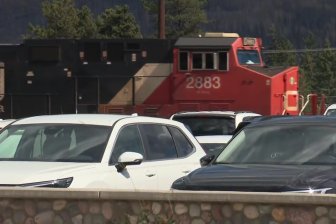Ottawa’s top doctor said Monday the city’s public health unit is exploring how it can monitor whether people are complying and coping with instructions to practice social distancing and self-isolation in order to curb the spread of COVID-19.

“I think that the feedback we have is that people are taking it seriously and there are exceptions and people are concerned about the exceptions,” Dr. Vera Etches, the city’s chief medical officer, said in a teleconference.
In recent days, health officials at all levels of government in Canada have doubling down on orders to practice social distancing to help contain transmission of the novel coronavirus.
In plain language, that means limiting the number of people with whom you come into close contact and maintaining a distance of two metres from other individuals.
Etches said Ottawa Public Health (OPH) not only wants to find out if people in the national capital are taking those directives seriously, but also how they’re managing to continue social distancing and what kind of challenges they’re facing.
“There may be things we can do to help people over time. If they’re having trouble with their mental health, we need to monitor what’s happening,” she said.
To accomplish this, the public health agency is looking “a few different tools,” including polling, according to Etches. That could involve phoning people and surveying how they’re doing and what measures they’re taking.
OPH is also exploring “using aggregated data,” potentially from “electronic sources” like cellphones, the top doctor added.
“That kind of information that would tell us: are people congregating or not,” Etches said. “You can tell that by some of the use of electronic media.”

For example, Etches said health officials don’t want to see people gathering in local parks, which officials have decided to keep open for now.
“We don’t want people to gather together, a group of players to play soccer. You can kick the ball around with someone in your household and stay two meters away from others,” she said.

Get breaking National news
If they find people are ignoring this messaging, officials may revisit the decision to leave parks open to the public, Etches said.
Residents complaining that neighbours aren’t self-isolating after travel
- Canadian government’s satellite deal has Tories calling for Elon Musk involvement
- Despite good economic news, experts warn the pain’s not over yet
- Activists call for Boogie the monkey to be removed from Ontario roadside zoo
- Jasper mayor says CN Rail relocation will be devastating: ‘Deeply disappointed’
As for self-isolation, the public health unit has received complaints from residents who claim their neighbours aren’t following orders to self-isolate for 14 days after returning from their travels, according to Etches.
She said it’s possible some people may have missed the messaging about self-isolation when they arrived, which is why OPH continues to share its recommendations through multiple channels.
“Let me try to be also very clear. If you’re self-isolating, it means that groceries and essential items should only be picked up by a family member or friend, or acquired through online ordering options, or through support that can be accessed through 211 with the city,” Etches said.
People who are self-isolating and aren’t sick can go out for walk, but they should do it alone.
“I can’t say it enough that you shouldn’t gather with anybody,” Etches said. “It’s important that people who are self-isolating really, completely limit those contacts to just household members.
Ideally, everyone at this point should only be in close contact with people they live with, “unless you have to go out to essential work or if you need an important support from someone else,” she said.
Ontario’s move to close non-essential businesses will help, top doctor says
Etches also touched on Ontario Premier Doug Ford’s move on Monday to order “non-essential” businesses to close by Tuesday night, saying this will help limit non-essential outings by people in Ottawa.
“It’s appropriate, to me, to send that message that people should not be out clothes shopping right now or not be getting a tattoo,” she said.
“I think it really does emphasize that that we are trying to limit contact between people at an unprecedented scale.”

Etches said officials are essentially aiming to build “a new social norm” and urged residents to take up the cause.
“We need to use our word of mouth and our own social persuasion skills to help people understand the rationale and the urgency of not gathering in groups and practicing social distancing,” she said.
“We need to work on this being the new norm.”
The provincial government – which declared a state of emergency last week amid the pandemic – reported three new confirmed cases of COVID-19 in Ottawa on Monday, bringing the total number of Ontario-confirmed cases in the national capital so far to 24.
Etches said on Sunday that coronavirus modelling data suggests there could be up to 4,000 undetected cases of the virus in the city.
Etches described the model as “a planning tool” that takes into account different variables. It helps officials predict what health care resources are needed and “potential positive impacts” such as social distancing and school closures, she said.
The top doctor stood by sharing that number on Monday, arguing “it helps people understand that COVID-19 is in our community and it helps us communicate that we all need to do our part to slow down transmission of infection.”









Comments